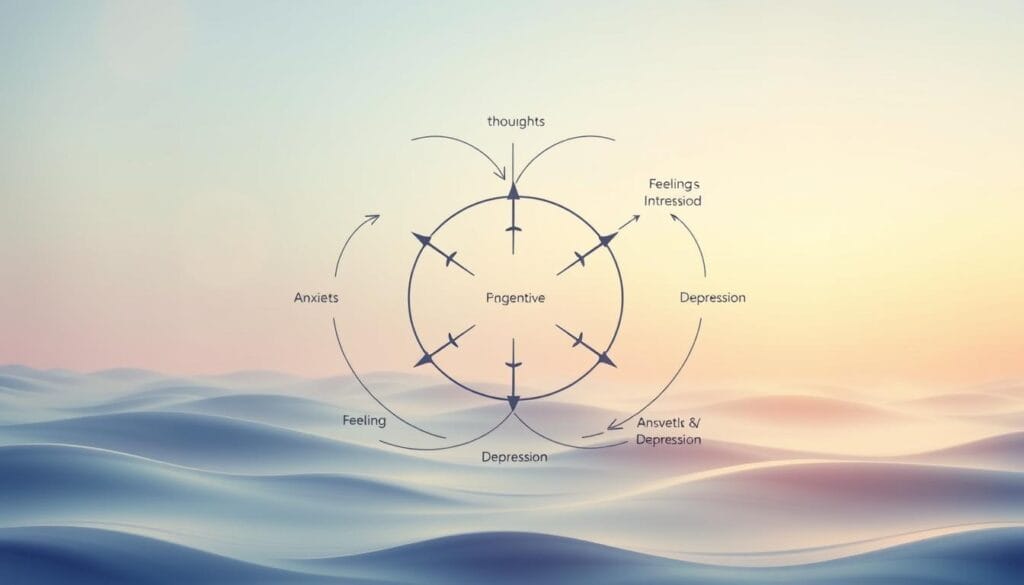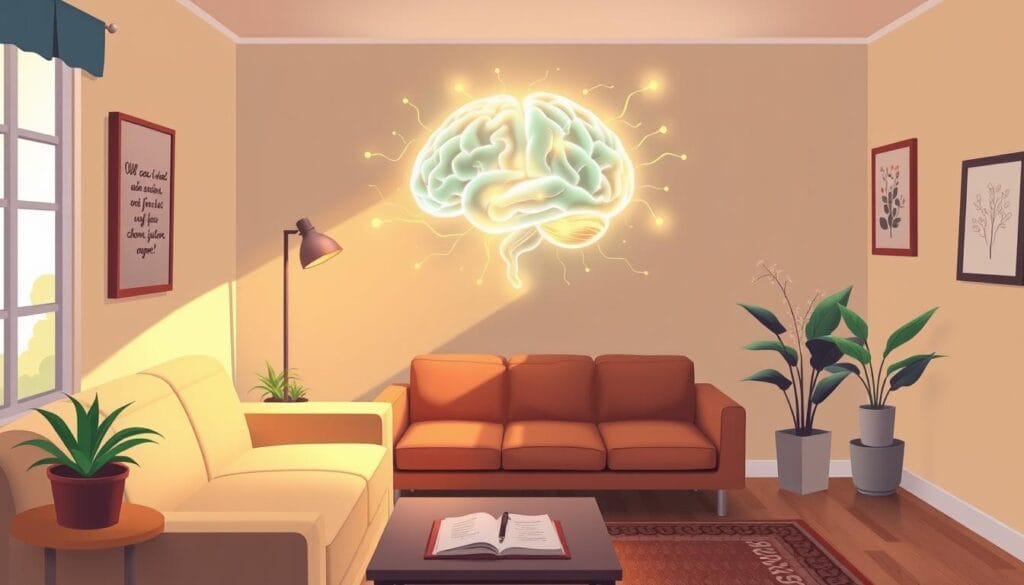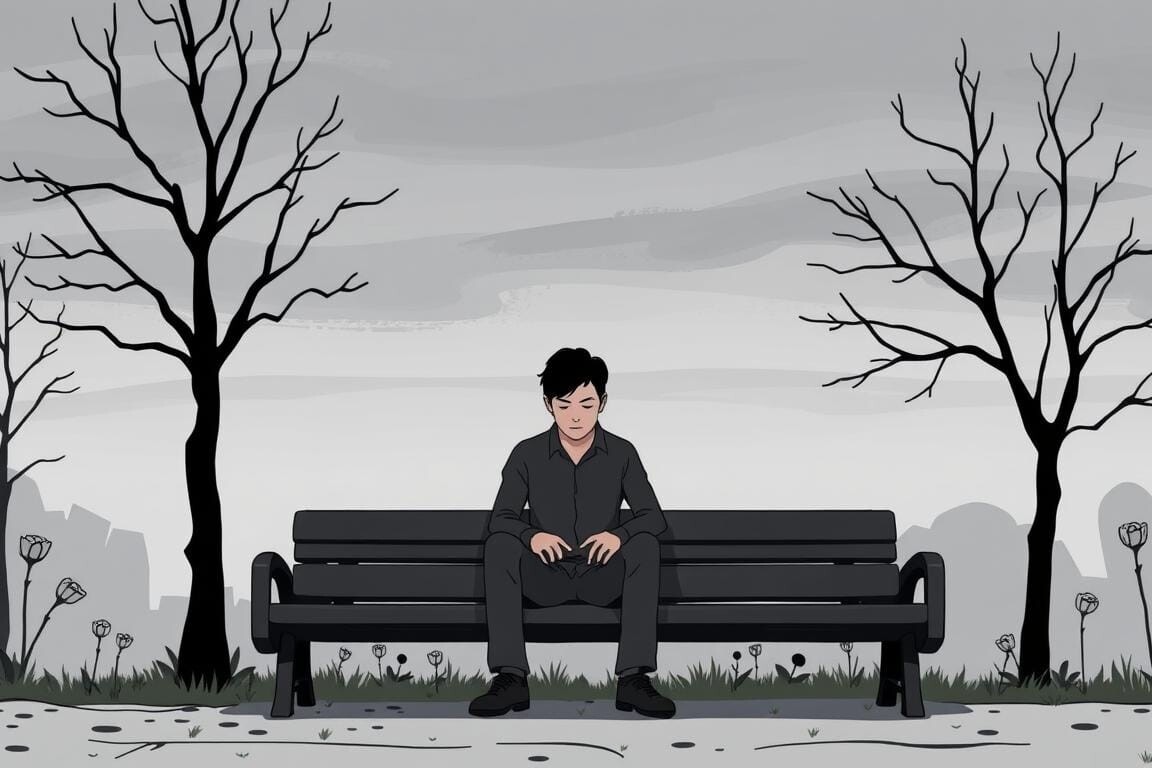Dealing with anxiety and depression can be tough. But, with the right help, you can feel better. Dr. Chandril Chugh, a well-known neurologist, will guide you. He shares the best ways to handle these common mental health problems.
Anxiety and depression affect many people of all ages and backgrounds. But, many don’t talk about it because of shame or not knowing enough. Dr. Chugh’s advice can help you take charge of your mental health and start healing.
This guide will show you the strength of therapies like CBT, exposure therapy, and mindfulness. These methods help change how you think, face fears, and understand yourself better. Dr. Chandril Chugh will help you find the therapy that fits you best. This way, you can start feeling better emotionally.
Table of Contents
ToggleUnderstanding Anxiety and Depression
Anxiety and depression are common mental health issues. They affect millions of people around the world. These conditions can change how you live, who you connect with, and how you feel about yourself.
Symptoms and Manifestations
Anxiety makes you worry a lot and feel scared. You might also feel like something bad is going to happen. Physical signs include a fast heartbeat, sweating, and tight muscles.
Depression makes you feel sad all the time. You might lose interest in things you used to enjoy. You could also sleep too much or too little, or feel very tired.
Prevalence and Impact
Many people have anxiety or depression. In fact, over 10% of Americans take antidepressants. This is especially true for people between 18 and 44.
These conditions can really affect your life. They can make it hard to do everyday things. But, there are treatments that can help.
Things like therapy and medicine can work well. Changing your lifestyle, like exercising and managing stress, can also help. These steps can improve your mental health.
Knowing about anxiety and depression can help you take care of your mental health. It’s important to seek help and support to overcome these challenges.
Cognitive Behavioral Therapy (CBT): The Gold Standard
Cognitive Behavioral Therapy (CBT) is seen as the top choice for treating anxiety and depression. It’s based on the cognitive model. This model shows how our thoughts, feelings, and actions are linked together.
The Cognitive Model: Understanding Thought Patterns
The cognitive model says our thoughts greatly affect our feelings and actions. By knowing the thoughts that lead to anxiety and depression, we can change them. We can switch to more positive and helpful ways of thinking.
CBT helps people spot and change negative thought patterns. These patterns include thinking the worst, generalizing too much, and seeing things as all or nothing. Working with a therapist, people learn new ways to handle their problems and feelings.
- CBT is considered the gold-standard psychological treatment due to being the most researched form of psychotherapy.
- CBT dominates international guidelines for psychosocial treatments and is considered a first-line treatment for many disorders.
- CBT is continuously evolving based on research and seen as a progressive research program.
CBT helps people deal with anxiety and depression by focusing on thoughts. It’s backed by lots of research and is a trusted treatment. It helps people take charge of their recovery.

Exposure Therapy: Confronting Fears and Anxieties
Exposure therapy is a strong tool for treating anxiety disorders. It involves slowly facing things that make you anxious. This helps you overcome fears and feel more in control.
Studies show exposure therapy works well. People who try it often see their anxiety symptoms drop by up to 90%. It’s especially helpful for those with phobias, panic disorder, and more.
There are different ways to do exposure therapy. You might face the real situation, imagine it, use virtual reality, or deal with physical feelings of anxiety. Your therapist will pick the best method for you.
At first, exposure therapy might seem scary. But it’s a powerful way to face your fears. By slowly facing your triggers, you can stop avoiding them and find new ways to cope. A skilled therapist will help you on this journey.
Remember, exposure therapy is not the same for everyone. Your progress will be unique. Your therapist will make sure the process is safe and fits your needs. With hard work and dedication, exposure therapy can change your life.
Mindfulness: A Powerful Tool for Self-Awareness
Mindfulness is a powerful practice for managing anxiety and depression. It helps you understand your thoughts, feelings, and actions better. This self-awareness lets you handle stress better and be kinder to yourself.
Studies show mindfulness helps with anxiety and depression. A study by Goyal et al. (2014) found meditation improves stress and well-being. Kabat-Zinn and Massion (1992) also found meditation helps with anxiety disorders.
Mindfulness improves your focus and thinking. Moore and Malinowski (2009) found mindfulness meditation boosts cognitive flexibility and attention. Ortner et al. (2007) showed it helps focus on tasks by reducing emotional distractions.
Adding mindfulness to your mental health journey is beneficial. It helps you understand yourself better and handle life’s challenges. Combining it with other therapies like cognitive behavioral therapy can be very effective.
Remember, mindfulness is a personal journey. Try different techniques like meditation, breathing exercises, and mindful walking. Regular practice can greatly improve your mental health and life quality.
Best therapy for anxiety and depression
Finding the right therapy for anxiety and depression is not easy. These conditions are complex and affect people differently. But, many therapies have shown to be very helpful.
Cognitive Behavioral Therapy (CBT) is a top choice. It helps change negative thoughts into positive ones. People often see improvements in just a few weeks.
Exposure Therapy is another effective method. It helps people face their fears slowly. Virtual Reality Exposure Therapy (VRE) is even more advanced and helps with PTSD and phobias.
Mindfulness-based therapies like Acceptance and Commitment Therapy (ACT) and Dialectical Behavioral Therapy (DBT) are also helpful. They teach people to deal with difficult thoughts and feelings better. These therapies promote self-awareness and living a meaningful life.
For those who don’t respond to usual treatments, Transcranial Magnetic Stimulation (TMS) is an option. It’s safe and non-invasive. Theta Burst Stimulation is a newer, faster version of TMS.
Choosing the right therapy for anxiety and depression is important. Work with a mental health professional to find the best fit for you. This way, you can make a plan that meets your needs and goals.
The Effectiveness of CBT for Anxiety and Depression
Many studies show that cognitive behavioral therapy (CBT) works well for anxiety and depression. It helps people feel better for a long time. This is because CBT changes how people think and act.
A study in the Annual Review of Psychology found CBT’s benefits last long after treatment. It helps people handle their feelings on their own. It also stops symptoms from coming back, which is great for keeping well.
Research backs up CBT’s success for anxiety and depression. It’s better than other treatments, like medicines, in making people feel and function better. This shows CBT is a strong choice for treating these issues.
When CBT is used with medicines, it works even better for severe depression. This shows how well CBT and medicines can work together. CBT helps people manage their thoughts and actions, leading to lasting recovery.
In summary, CBT is a top choice for treating anxiety and depression. It gives people the tools to overcome their problems. This leads to a better life and more happiness.

Medications: A Complementary Approach
Therapy is often the main way to handle anxiety and depression. But, medications can also help. It’s key to get advice from a pro before starting any meds.
Types of Medications
Antidepressants, like SSRIs and SNRIs, help with depression. Anti-anxiety meds, like benzodiazepines and buspirone, ease anxiety symptoms.
Importance of Professional Guidance
Getting help from a mental health expert is vital for meds. They tailor advice to your needs and health. They also check how well the meds work and watch for side effects.
The FDA doesn’t check most alternative treatments for mental health. The National Center for Complementary and Integrative Health (NCCIH) does. Some studies show these treatments can be safe.
Combining therapy, meds, and lifestyle changes works best for anxiety and depression. With a mental health pro, you can find the best treatment for you.
Lifestyle Modifications: A Holistic Approach
Managing anxiety and depression can be helped by making lifestyle changes. These changes can support your mental health by addressing both mind and body. Let’s look at how different lifestyle factors can help.
Exercise is a big help against anxiety and depression. Doing regular physical activities, like aerobic exercises, can make you feel better. Try to exercise for at least 30 minutes, most days of the week.
Good sleep is key for your mental health. Having a regular sleep schedule and a calm sleep area can help. Getting enough sleep lets your body and mind rest, which helps fight anxiety and depression.
What you eat matters too. Eating a balanced diet with lots of fruits, veggies, whole grains, and lean proteins is good. Stay away from too much caffeine, alcohol, and junk food, as they can make things worse.
Learning to manage stress is also important. Try deep breathing, meditation, or yoga to relax. Doing hobbies, enjoying nature, and having a strong support system can also help.
Adding these lifestyle changes to your daily life can help improve your mental health. Remember, what works for someone else might not work for you. So, try different things to find what works best for you.

Seeking Professional Help
Getting help for anxiety and depression is crucial. Working with therapists can give you the tools and support you need. They help you create a plan to tackle your issues.
Finding the Right Therapist
Finding the right therapist is key to success. Look at their specialty, approach, and how they communicate. Use online resources to find therapists and read reviews.
- Find therapists who know a lot about anxiety and depression. They use proven treatments like CBT.
- Think about what kind of therapy you prefer. Do you like a structured plan or exploring feelings?
- Make sure you feel comfortable talking to your therapist. They should listen well and understand you.
- Consider things like location, schedule, and insurance. Find a therapist that fits your life and budget.
Getting help is a brave step towards better mental health. With the right therapist, you can learn to cope better. You can also change negative thoughts and improve your well-being.
Support Systems: The Power of Community
Facing anxiety and depression alone is tough. But, you’re not alone. Building a strong support system is key to recovery. Connecting with family, friends, and mental health groups gives you emotional support and practical help.
Reaching out to your support systems makes you feel part of a community. They offer a safe place to share feelings and learn from others. This support keeps you motivated and on track to better mental health.
Community resources are also crucial for recovery. They include support groups, counseling, and mental health experts. These resources give you tools to manage symptoms and find healthy ways to cope. They make you feel empowered and connected, boosting your well-being.

You don’t have to face anxiety and depression alone. Lean on your support systems for help. With the right support, you can overcome these challenges with strength and resilience.
Overcoming Stigma: Embracing Mental Health
It’s key to tackle the stigma around mental health. This helps people feel okay to ask for help and care for their minds. Even though many face mental health issues, getting support is hard because of social and personal barriers.
Stigma can cause people to be judged or treated unfairly. It makes them shy away from getting help. It also leads to misunderstandings from family and friends, and can affect work and school life.
To beat these challenges, we need to understand mental health better. Joining groups like the National Alliance on Mental Illness (NAMI) helps. It teaches people about mental illness and fights stigma.
- Speak out against stigma to encourage others facing similar challenges and educate the public about mental illness.
- Seek treatment, as it can reduce symptoms interfering with work and personal life.
- Advocate for your rights, as discrimination against students with mental illness is illegal, and schools are required to provide accommodations and support services.
By reducing stigma and creating a more caring world, we help people focus on their mental health. This way, they can get the support they need to heal.
Conclusion
We hope this guide has helped you feel ready to improve your mental health. Cognitive Behavioral Therapy (CBT) is the best way to treat anxiety and depression. It has shown to be very effective in many studies.
Medicine can help too, but a mix of therapies, lifestyle changes, and community support is key. By taking care of yourself, changing negative thoughts, and facing fears, you can improve your mental health. This will make your life better overall.
You’re not alone in this fight. Get help from licensed therapists and support from friends, family, and mental health advocates. Together, we can fight the stigma of anxiety and depression. This will help more people focus on their mental health and live happier lives.
FAQ
What are the symptoms and manifestations of anxiety and depression?
Anxiety and depression show many symptoms. These include too much worry, fear, and sadness. They also include feeling hopeless and affecting life and relationships.
What is the prevalence and impact of anxiety and depression?
Anxiety and depression are common worldwide. They affect millions of people. These conditions deeply impact daily life, relationships, and well-being.
How does cognitive behavioral therapy (CBT) work in the treatment of anxiety and depression?
CBT is a top treatment for anxiety and depression. It shows how thoughts, feelings, and actions are linked. By changing negative thoughts, people can feel better.
How does exposure therapy help in overcoming anxiety disorders?
Exposure therapy helps with anxiety disorders. It helps people face what scares them. This way, they can manage their anxiety and feel in control again.
How can mindfulness-based interventions complement cognitive behavioral therapy?
Mindfulness helps with CBT for anxiety and depression. It teaches being present and understanding feelings. This helps people handle stress better and accept themselves.
What are the key features and benefits of the best therapy options for addressing anxiety and depression?
Top therapies for anxiety and depression include CBT, exposure therapy, and mindfulness. They help change for the better. They also help people manage their mental health and feel better overall.
What does the research say about the effectiveness of cognitive behavioral therapy (CBT) in treating anxiety and depression?
Studies show CBT is very effective for anxiety and depression. It helps people feel better for a long time. It also helps them manage their mental health on their own.
What role can medications play in the treatment of anxiety and depression?
Medications like antidepressants can help with anxiety and depression. It’s important to talk to a mental health expert about them. They can help find the right medication and watch for side effects.
How can lifestyle modifications support the management of anxiety and depression?
Changes in lifestyle, like exercise and sleep, can help with mental health. They work well with therapy. A holistic approach can improve well-being and help with challenges.
Why is it important to seek professional help for addressing anxiety and depression?
Getting help from mental health experts is key for anxiety and depression. They can create a treatment plan. They also help find the right therapist and check if therapy is working.
How can building a strong support system contribute to the recovery process for individuals with anxiety and depression?
A strong support system is vital for recovery. Connecting with family, friends, and support groups helps. It offers emotional support and understanding, which helps with healing.
How can we address the stigma surrounding mental health conditions and empower individuals to seek help?
We need to fight the stigma around mental health. By raising awareness and understanding, we can help people seek help. This creates a supportive environment for recovery.
Source Links
About The Author

Medically reviewed by Dr. Chandril Chugh, MD, DM (Neurology)
Dr. Chandril Chugh is a U.S.-trained, board-certified neurologist with expertise in diagnosing and managing neurological disorders, including migraines, epilepsy, Parkinson’s disease, and movement disorders. His clinical focus includes evidence-based neurological care and patient education.
All content is reviewed for medical accuracy and aligned with current neurological guidelines.




